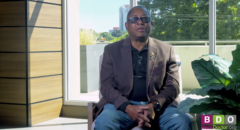In Dr. William Carson’s experience, he says, “It is as difficult today to get African Americans to participate in clinical trials as it was 20 years ago.” Why is that? Many of us are fearful about clinical trials, recalling the Tuskegee Experiment and others. Or, we are uninformed about what really happens during participation in a clinical trial. In this “CEO Spotlight” segment, Dr. Carson, former CEO of Otsuka, shares his insights on why more Black Americans should participate in clinical trials. Watch the full interview with Dr. Carson here. Read below for Dr. Carson’s perspectives on clinical trials for Black Americans.
Overcoming Fear to Participate in Clinical Trials
We should run to the front of the line to participate in clinical trials. One aspect of every clinical trial is that patients get a very thorough physical evaluation. So, when was the last time you had a great physical [examination] and somebody paid you for it? We’ve found in almost every trial that we’ve done, we always find somebody who has a condition that needs to be treated. If they didn’t participate in the trial, they may not have known that that condition needed to be treated. So that is a benefit attached to the evaluation process.
If you have the conditions that are being studied, you actually might during a part of the clinical trial have active drug. The way clinical trials are done, people are treated with active drugs and placebo. But in almost all clinical trials… the patients have a way to get on the active [experimental] drug, the experimental drug.
And another benefit, especially of pharmaceutical trials, is that patients can have the drug. If that drug is working for you, in most clinical trials you can have that drug until the drug makes it to market. So, you might have been treated for years, prior to people having access to drugs. So, you have early access to new drugs, with new mechanisms of action.
Challenging Misconceptions about Clinical Trials and the Tuskegee Syphilis Trials
I think that the safety question comes from a historic perspective with the Tuskegee Syphilis trials. And, now…I would probably challenge most people to say, do you actually really know what happened in the trial? And most people would probably go, I just know something happened, and black people shouldn’t be in clinical trials because of Tuskegee. But that being said, I think that every trial requires informed consent.
The Importance of Informed Consent in Clinical Trials
Informed consent means that you have to go through every part of the trial, what will happen, what are you going to get, how long will it take, what would it look like, and you have to say, “I understand what you just told me,” and sign it. And the person who’s working with you [will] also sign. So, if you go through all of that and you understand what the doctor’s telling you, you should have [confidence in] your participation. Can there be consequences? Sure. Could you have an adverse event? Of course, you could. And that is why you do the trials, to understand [if] the drugs work from an efficacious perspective, or…what is the side effect profile? And I think that, if you if you are an informed participant, then I think there should be no challenge or issue.
Challenges in Recruiting African Americans for Clinical Trials
There’s one aspect of the filing that goes within the FDA which says have you looked at a diverse population? I’ve been doing this from an industry perspective for almost 20 years, and it is as difficult today to get African Americans to participate in trials as it was 20 years ago. I see no change. I see the exact same discussion. I see the exact same resolution. And, it’s probably one of the most asked questions that I’ve had through my career. And people can be very, like, oh, you know, I’m not gonna participate in, Why are you experimenting on us? And so forth. And I just say, why didn’t you come to this from a place of knowledge? Why didn’t you come from this from a place of understanding? And why didn’t you think about the benefits that could accrue from participating in research?







